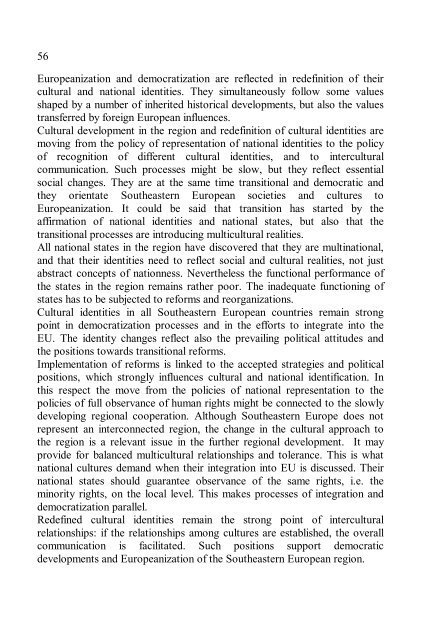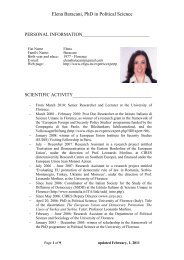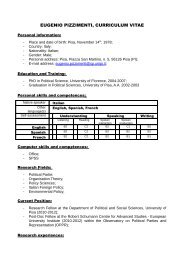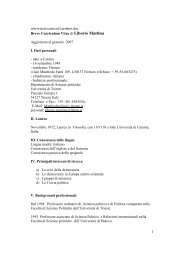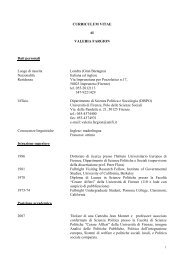- Page 1 and 2:
Proceedings of the Conference. EURO
- Page 3 and 4:
Tutti i diritti sono riservati. Nes
- Page 5 and 6: Part V Enlargement conditionality a
- Page 7 and 8: 6 democracy. At the same time, the
- Page 9 and 10: 8 makes this analysis more valuable
- Page 11 and 12: 10 2.2 “Domestic-Policy-Factors
- Page 13 and 14: 12 Russian Constitutional Court ref
- Page 15 and 16: 14 Russian regions seems to be one,
- Page 17 and 18: 16 3.2 Hypotheses The set of the hy
- Page 19 and 20: 18 regions, companies, and organiza
- Page 21 and 22: 20 level in this particular Model).
- Page 23 and 24: 22 face directly the problem of the
- Page 25 and 26: 24 Table 2: The impact of the Europ
- Page 27 and 28: 26 democracy). Unfortunately the te
- Page 29 and 30: 28 Context Geopolitics Economics Et
- Page 31 and 32: 30 5.4 Importance of RCE in regime
- Page 33 and 34: Londa Esadze Chairwoman Independent
- Page 35 and 36: 34 But recent events in Georgia hav
- Page 37 and 38: 36 Why Georgia First, a “revoluti
- Page 39 and 40: 38 leaders and NGOs. The Council of
- Page 41 and 42: 40 I am afraid that Georgia’s new
- Page 43 and 44: 42 We need a Knowledge Management:
- Page 45 and 46: 44 use cultural identification to a
- Page 47 and 48: 46 Yugoslav federation. The transit
- Page 49 and 50: 48 ex-Yugoslavia to developing coun
- Page 51 and 52: 50 of a national state, fully based
- Page 53 and 54: 52 The role of states The states ar
- Page 55: 54 European influences The attracti
- Page 60 and 61: Cadenzas of Democratisation Democra
- Page 62 and 63: * * * The relationship between musi
- Page 64 and 65: Convention on Human Rights (ECHR),
- Page 66 and 67: 65 Based on the Copenhagen related
- Page 68 and 69: Union to apply different levels of
- Page 70: other words, as far as the complian
- Page 73 and 74: 72 empire (see Wilhelem, 2003). Aft
- Page 75 and 76: 74 country-specific idiosyncrasies.
- Page 77 and 78: 76 carefully the behaviour of the n
- Page 79 and 80: 78 modernization approach has also
- Page 81 and 82: 80 to be taken into account that th
- Page 83 and 84: 82 opportunities and difficulties t
- Page 85 and 86: 84 interests. National interest is
- Page 87 and 88: 86 also within the “East”. The
- Page 89 and 90: 88 may not yet be ready institution
- Page 91 and 92: 90 prepared enough for assisting th
- Page 93 and 94: 92 sum game after a successful post
- Page 95 and 96: 94 called Lisbon Strategy. Accordin
- Page 97 and 98: 96 Strategy has to turn from a domi
- Page 99 and 100: 98 The contradiction is obvious and
- Page 101 and 102: 100 Second, the Lisbon Strategy is
- Page 103 and 104: 102 and Czechia - have prepared a m
- Page 105 and 106: 104 implement the Lisbon Agenda. Ye
- Page 107 and 108:
106 Dauderstaedt, Michael (2004)
- Page 109 and 110:
108 Pridham, Geoffrey (2005) Design
- Page 111 and 112:
110 (Systemwechsel, Opladen: Leske+
- Page 113 and 114:
112 topic “efficiency or democrac
- Page 115 and 116:
114 32 “There has long been a str
- Page 117 and 118:
116 relations. Political effects fr
- Page 119 and 120:
118 regional organisations like the
- Page 121 and 122:
120 Programme and twinning arrangem
- Page 123 and 124:
122 (4) Democratic Conditionality a
- Page 125 and 126:
124 involvement in judicial affairs
- Page 127 and 128:
126 realities that have complicated
- Page 129 and 130:
128 Monetary Fund for example. Howe
- Page 131 and 132:
130 public level, although in some
- Page 133 and 134:
132 political change was accompanie
- Page 135 and 136:
134 new domestic complications in t
- Page 137 and 138:
136 aside from the special impact o
- Page 139 and 140:
138 23 One Czech interview responde
- Page 141 and 142:
140 particular institutions (i.e.,
- Page 143 and 144:
142 other sectors of the national e
- Page 145 and 146:
144 servants coalesce as a social g
- Page 147 and 148:
146 current case, Europeanization i
- Page 149 and 150:
148 and Accession Partnerships, whi
- Page 151 and 152:
150 The Social Democrats’ previou
- Page 153 and 154:
152 EU on domestic actors’ strate
- Page 155 and 156:
154 “twinners” played negligibl
- Page 157 and 158:
156 Upon entering office, the new S
- Page 159 and 160:
158 individuals to criticize the dr
- Page 161 and 162:
160 recommendations. 29 In February
- Page 163 and 164:
162 Comparisons and conclusions Wha
- Page 165 and 166:
164 wide domestic institutions that
- Page 167 and 168:
166 take shape only from the thirti
- Page 169 and 170:
168 nothing but agonize until the e
- Page 171 and 172:
170 not happen within the judiciary
- Page 173 and 174:
172 the names of Nixon’s close as
- Page 175 and 176:
174 the part of the President of th
- Page 177 and 178:
176 In Europe, it has been a tradit
- Page 179 and 180:
178 has been that the Court of Cass
- Page 181 and 182:
180 he/she may expect disciplinary
- Page 183 and 184:
182 members of that supreme judicia
- Page 185 and 186:
184 considerable autonomy has also
- Page 187 and 188:
186 ruling. On the one hand, this p
- Page 189 and 190:
188 - for the time being - not clea
- Page 191 and 192:
190 pressure is reflected most dire
- Page 193 and 194:
192 prosecutors with the Chief Pros
- Page 195 and 196:
194 • complete lack of transformi
- Page 198 and 199:
Center of European Excellence Unive
- Page 200 and 201:
199 change. Differently from other
- Page 202 and 203:
201 conformity with the European Co
- Page 204 and 205:
1.2. The European Neighbourhood Pol
- Page 206 and 207:
205 benchmarks, which should be mon
- Page 208 and 209:
2.1. Some political liberalization
- Page 210 and 211:
209 low: only 51 percent of registe
- Page 212 and 213:
211 international human rights conv
- Page 214 and 215:
213 Encouraged by the EC Mediterran
- Page 216 and 217:
215 respected in practice, as the s
- Page 218 and 219:
217 parties, to guarantee judicial
- Page 220 and 221:
219 REFERENCES − Elena Baracani,
- Page 222 and 223:
221 APPENDIX Table 1: The European
- Page 224 and 225:
SUPPORTING THE ENP Existing financi
- Page 226 and 227:
Table 5: ENP Proposed Action Plan f
- Page 228 and 229:
The EU external policies towards Ro
- Page 230 and 231:
229 Accession Partnerships were agr
- Page 232 and 233:
231 2. The Stabilisation and Associ
- Page 234 and 235:
233 Commission’s Annual Reports.
- Page 236 and 237:
235 justice and home affairs; energ
- Page 238 and 239:
237 political circumstances, the Hi
- Page 240 and 241:
239 be done to reinforce and make e
- Page 242 and 243:
241 vulnerable to political and adm
- Page 244 and 245:
243 Börzel and Risse (2004) have a
- Page 246 and 247:
245 Ukraine Neighbouring country Ne
- Page 248 and 249:
247 Table 4, Rule of Law Priorities
- Page 250 and 251:
249 - Communication from the commis
- Page 252 and 253:
The Europeanization of Regions. Res
- Page 254 and 255:
253 from the empirical evidence der
- Page 256 and 257:
255 Figure 2. Key dimensions, dicho
- Page 258 and 259:
257 representation. However, this s
- Page 260 and 261:
259 However, we must bear in mind t
- Page 262 and 263:
261 Figure 3. Key dimensions and tr
- Page 264 and 265:
263 Olsen 1989), an elite which inf
- Page 266:
265 -- (2003), « Les effets de l'e
- Page 269 and 270:
268 Community Initiative (CI). In s
- Page 271 and 272:
270 especially after the commitment
- Page 273 and 274:
272 and local economic development.
- Page 275 and 276:
274 The lack of domestic policy tra
- Page 277 and 278:
276 coordination between actors par
- Page 279 and 280:
278 the experimental logic of the p
- Page 281 and 282:
280 standards, degree of organisati
- Page 283 and 284:
282 nature of urban partnerships in
- Page 285 and 286:
284 main areas of activities of the
- Page 287 and 288:
286 division of responsibilities an
- Page 289 and 290:
288 of the city. Disparities betwee
- Page 291 and 292:
290 Decentralisation reforms crash
- Page 293 and 294:
292 institutional conditions, preva
- Page 295 and 296:
294 In Thessaloniki, the large numb
- Page 297 and 298:
Kafkalas G, 1992, “Strategies for
- Page 299 and 300:
298 demands of the European Union,
- Page 301 and 302:
300 subregional interests, networks
- Page 303 and 304:
302 troubled path of regionalisatio
- Page 305 and 306:
304 setting regions against each ot
- Page 307 and 308:
306 Local powers have always been h
- Page 309 and 310:
308 the Coordination Commissions ha
- Page 311 and 312:
310 operating within local contexts
- Page 313 and 314:
312 invariably mediated by state of
- Page 315 and 316:
314 the region’s area and 25% of
- Page 317 and 318:
316 making represents, at best, a "
- Page 320 and 321:
First draft. Comments very welcome.
- Page 322 and 323:
321 least in theory, this provision
- Page 324 and 325:
323 Positing these “caveats” is
- Page 326 and 327:
325 (the well-known “Tangentopoli
- Page 328 and 329:
327 economic forces are still far f
- Page 330 and 331:
329 Figure 2. Analytical dimensions
- Page 332 and 333:
331 of the Southern regions (Abruzz
- Page 334 and 335:
333 B) A second group of regions ch
- Page 336 and 337:
335 favoured, over time, the develo
- Page 338 and 339:
337 provided that the quota of popu
- Page 340 and 341:
339 change is a strong commitment o
- Page 342 and 343:
341 regional Executive is strengthe
- Page 344 and 345:
343 Identity/Inter ests § Politica
- Page 346 and 347:
345 Desideri Carlo 1995 “Italian
- Page 348 and 349:
347 APPENDIX Table 1: Financial res
- Page 350 and 351:
349 Tab. 4: Number of Interregional
- Page 352 and 353:
351 Table 6: The Italian regions in
- Page 354 and 355:
353 END NOTES 1 This paper results
- Page 356 and 357:
ENLARGEMENT CONDITIONALITY AND DEMO
- Page 358 and 359:
357 The nature of a specific applic
- Page 360 and 361:
359 foreign policy. Yugoslavia in 1
- Page 362 and 363:
361 Postponement”, „Policy of P
- Page 364 and 365:
363 The Impact of the NATO Conditio
- Page 366 and 367:
e used for the purchase of new equi
- Page 368 and 369:
instrument of pressure once. The ch
- Page 370 and 371:
369 for collective defence and has
- Page 372 and 373:
371 Bibliography 1. ALBRIGHT, Madel
- Page 374 and 375:
Europeanisation in Kaliningrad Adap
- Page 376 and 377:
375 involved in, from which adaptiv
- Page 378 and 379:
Fig. 1: Actors and types of interna
- Page 380 and 381:
379 assistance allocated to the Kal
- Page 382 and 383:
381 Fig. 2: Mechanisms of Europeani
- Page 384 and 385:
383 the political struggles in Russ
- Page 386 and 387:
385 even below the all-Russian aver
- Page 388 and 389:
387 their rejection as ‘anarchist
- Page 390 and 391:
389 2004: 38-40). A regional enviro
- Page 392 and 393:
391 Kaliningrad region during post-
- Page 394 and 395:
393 Europeanisation takes place als
- Page 396 and 397:
395 McAdam, Doug, et al. (eds.) (19
- Page 398 and 399:
By Jørgen Møller, Research studen
- Page 400 and 401:
399 Figure 1: Levels of conceptuali
- Page 402 and 403:
401 argument is that without these,
- Page 404 and 405:
403 II. How do liberal rights becom
- Page 406 and 407:
405 degrees, in other European stat
- Page 408 and 409:
407 solving their fiscal problems s
- Page 410 and 411:
409 It does make sense to explicate
- Page 412 and 413:
411 going to happen to it, it is un
- Page 414 and 415:
413 in the next place oblige it to
- Page 416 and 417:
415 VI. Back in the (post-)USSR So
- Page 418 and 419:
417 As the figure shows, Belarus co
- Page 420 and 421:
419 power straight away - there wer
- Page 422 and 423:
421 Diamond, Larry (1996), “Is th
- Page 424:
423 Schumpeter, Joseph A. (1991),
- Page 427 and 428:
426 geographical, but from the func
- Page 429 and 430:
428 are only some of the examples w
- Page 431 and 432:
430 500 thousand illegal immigrants
- Page 433 and 434:
432 Economic Space was made, the ne
- Page 435 and 436:
434 with policies rather than polit
- Page 437 and 438:
436 The counter-factual situation i
- Page 439 and 440:
438 CEC (2005b): TERRITORIAL STATE
- Page 441 and 442:
440 Van Ravesteyn, N. And Evers, D.
- Page 443 and 444:
442 as an individual case study of
- Page 445 and 446:
444 elements in the Europeanization
- Page 447 and 448:
446 With respect to the effectivene
- Page 449 and 450:
448 negotiations process. It can be
- Page 451 and 452:
450 2000 when, fallowing the genera
- Page 453 and 454:
452 identical curricula and textboo
- Page 455 and 456:
454 perspective. This rather pessim
- Page 457 and 458:
456 The EU, through Emma Nicholson,
- Page 459 and 460:
458 Starting with the ``independenc
- Page 461 and 462:
460 of law adoption, namely assumin
- Page 463 and 464:
462 Other related criteria: The Adm
- Page 465 and 466:
464 Consequently it can be said tha
- Page 467 and 468:
466 Chapter13 Social Policy, is a v
- Page 469 and 470:
468 accession negotiations proceede
- Page 471 and 472:
470 criteria, thus inducing a proce
- Page 473 and 474:
472 Dimitrova A., Enlargement, Inst
- Page 476 and 477:
Europeanisation and Policy Space in
- Page 478 and 479:
477 The parliamentary election of 2
- Page 480 and 481:
479 Labour Party, the Social Democr
- Page 482 and 483:
481 (Sartori 1976). The increased f
- Page 484 and 485:
483 Social cleavages in Lithuania h
- Page 486 and 487:
485 organisations in 2004.8 If one
- Page 488 and 489:
487 HOW MUCH AND WHAT KIND OF EUROP
- Page 490 and 491:
489 Europe in general. Dominant dis
- Page 492 and 493:
491 list. Yet, The EU membership ha
- Page 494 and 495:
493 representing national minoritie
- Page 496 and 497:
CONCLUSIONS Integration to the EU a
- Page 498:
497 8. Lewis, Paul G. (2004), EU En
- Page 501 and 502:
500 major European powers, importan
- Page 503 and 504:
502 interchangeable nature of appoi
- Page 505 and 506:
504 on the right to liberty, equali
- Page 507 and 508:
506 Mustafa Kemal wanted to shape t
- Page 509 and 510:
508 2) TRANSITION TO MULTI-PARTY PO
- Page 511 and 512:
510 tradition of monopolistic power
- Page 513 and 514:
512 cleavages between the left and
- Page 515 and 516:
514 the international capitalist sy
- Page 517 and 518:
516 actor in the transition of the
- Page 519 and 520:
518 transnationalized security thre
- Page 521 and 522:
520 from the second half of the 198
- Page 523:
522 23 Heper, & Sayari, 2002, p. 80


